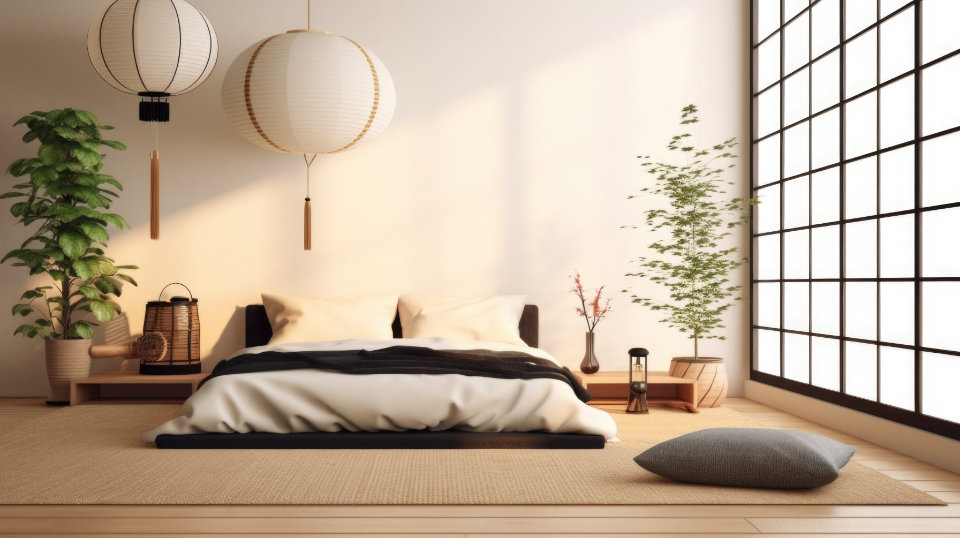Feng Shui, an ancient Chinese art, plays a pivotal role in harmonizing one’s living space, promoting both wellbeing and balance. In the realm of rest and relaxation, the bedroom becomes a crucial focus.
This guide delves into optimizing your bedroom Feng Shui, transforming it into a haven of tranquility and harmony.
Table of Contents
Understanding the Basics of Feng Shui
Feng Shui, literally translating to “wind-water,” is more than just a design philosophy; it’s a way of life. At its heart, Feng Shui is about harmonizing with the surrounding environment. In the bedroom, it’s believed to influence sleep quality and overall well-being.
The Ideal Feng Shui Bedroom Layout
The layout of a bedroom and sleeping direction according to Feng Shui principles is pivotal in creating a serene and balanced environment.
- Bed Placement: The bed should ideally be placed in a commanding position. This means it should be situated farthest from the door but still in a spot where the door can be seen easily. This placement offers a sense of security and control.
- Avoiding the “Death Position”: In Feng Shui, having your feet directly in line with the door is known as the “death position.” This placement is believed to disrupt the flow of energy and should be avoided.
- Distance from Windows: Positioning the bed directly under a window can lead to a restless sleep, as it’s considered a source of incoming energy that can be overwhelming.
- Wall Support: The bed should have a solid wall behind it for support. Avoid placing it under a sloped ceiling or beam, which can create a sense of oppression.
- Symmetry for Balance: Incorporating symmetry in the bedroom layout, such as using two nightstands, can create a balanced and harmonious energy.
Choosing the Right Colors for a Bedroom Feng Shui
The color palette of your bedroom can greatly influence your mood and the room’s overall energy. Incorporating your lucky colors can add an extra layer of positivity.
- Soft, Earthy Tones: Colors like light brown, beige, or soft yellow can create a calming and grounding effect, ideal for a restful bedroom.
- Cool Blues and Greens: These colors are known for their soothing properties, promoting relaxation and tranquility.
- Lucky Colors: In Feng Shui, certain colors are considered lucky and can bring good fortune. For instance, red symbolizes luck and joy, while purple represents nobility and wealth. Incorporating these colors in accents can boost the room’s positive energy.
- Avoid Over Stimulating Colors: Bright reds or vibrant oranges, while considered lucky, can be overly stimulating for a bedroom. It’s best to use them in moderation.
Bedroom Feng Shui-Friendly Furniture
Choosing the right furniture is not just about style for a good bedroom Feng Shui; it’s about promoting energy flow and creating a balanced environment.
- Smooth Over Sharp: Opt for furniture with smooth, rounded edges rather than sharp corners, which can create a harsh energy.
- Minimalistic Approach: Overcrowding a room with furniture can hinder the flow of chi (energy). Select pieces that are necessary and maintain a clutter-free space.
- Natural Materials: Using furniture made from natural materials like wood can enhance the room’s energy, making it feel more grounded and connected to nature.
- Proper Placement: Arrange the furniture in a way that allows for a smooth flow of energy. This means avoiding blocking the door with any large pieces and allowing ample space for movement.
- Avoid Mirrors Facing the Bed: In Feng Shui, mirrors reflecting the bed can lead to restlessness and amplify worries. It’s best to position mirrors where they don’t directly face the bed.
- Bed Height: In bedroom Feng Shui, the height of the bed can influence the flow of chi, or energy, around the room. Ideally, a bed should be high enough off the ground to allow for free flow of energy underneath. This typically means a bed height where the mattress top is about 18 to 24 inches from the floor.
This height is considered practical for getting in and out of bed comfortably and symbolizes a balanced position between the earth and the sky. Beds with storage underneath, while practical, are generally not recommended in Feng Shui, as they can block energy flow. - Sleeping on the Floor: While sleeping on the floor is not typical in Western cultures, it’s a common practice in many parts of the world and can be aligned with Feng Shui principles. Sleeping closer to the ground can symbolize stability and grounding.
However, it’s important to ensure that the sleeping area is clean and clutter-free and that the mattress or bedding is comfortable and supportive. If choosing to sleep on the floor, a tatami mat or a low platform bed can provide a slight elevation, which helps maintain a subtle flow of chi and protects from the cold and any dampness that may rise from the ground. - Double-Decker Beds: In bedroom Feng Shui, double-decked beds, commonly known as bunk beds, have certain considerations. They are often practical for space-saving in shared bedrooms, but they come with specific energy implications. The person sleeping on the top bunk is in a better Feng Shui position because they are higher up, which allows for freer flow of chi around them.
However, this can also lead to a feeling of instability or being disconnected from the grounding energy of the earth. For the person on the lower bunk, the overhanging structure can create a sense of heaviness or oppression, often referred to as “overhead pressure” in Feng Shui.
This can potentially lead to restless sleep or a feeling of being overwhelmed. If a double-decked bed is necessary, ensure that the lower bunk has enough space to sit up comfortably and that the bed as a whole is positioned in a way that does not directly face the door.

Lighting and Its Role in Bedroom Feng Shui
Lighting is more than just a functional element; it’s a crucial factor in creating the right balance of energy in your bedroom Feng Shui.
Proper lighting can transform the mood of the space, influencing both physical and emotional well-being.
- Layered Lighting: Incorporate a mix of different light sources. Ambient lighting sets the overall mood of the room, task lighting is essential for reading or other activities, and accent lighting can highlight key features or decor.
- Natural Light: Maximizing natural light is a fundamental aspect of Feng Shui. During the day, allow as much sunlight as possible to enter the room. This promotes a strong connection with the natural world and rejuvenates the room’s energy.
- Soft and Warm Lights: In the evening, use soft and warm lighting to create a relaxing and cozy atmosphere. Harsh, bright lights can disrupt the calming energy needed in a bedroom for restful sleep.
- Adjustable Lighting: Using dimmer switches can be beneficial in controlling the room’s energy flow. They allow you to adjust the lighting according to the time of day and your activities.
- Avoid Overhead Lights Directly Above the Bed: Positioning strong overhead lights directly above the bed can create a heavy, oppressive energy. It’s better to opt for side lamps or indirect lighting.
- Hanging Lights: Hanging lights, such as pendant lights or chandeliers, can be a beautiful addition to a bedroom, but their placement and style are crucial in bedroom Feng Shui. They should be positioned to ensure they don’t hang directly over the bed or create a pressing feeling while lying down. Ideally, hang them in the room’s center or over a non-sleeping area, like a reading nook or dressing area. The style of the hanging light should contribute to the room’s overall sense of calm and balance; overly large, bright, or ornate fixtures can disrupt the peaceful energy. Soft, diffused light from these fixtures can add a sense of warmth and serenity to the bedroom.
Decorative Elements in Bedroom Feng Shui
Decor in a bedroom Feng Shui serves not just an aesthetic purpose but also helps in balancing and enhancing the energy of the space.
- Artwork and Imagery: Choose artwork that evokes a sense of peace and tranquility. Images of nature, serene landscapes, or gentle patterns are ideal. Avoid imagery that is too vibrant, chaotic, or emotionally charged.
- Balance and Symmetry: Strive for a balanced arrangement in your decor. For instance, having a pair of matching lamps or similar decorative items on either side of the bed promotes harmony.
- Incorporate Feng Shui Elements: Introduce decorative items that represent the five Feng Shui elements – wood, fire, earth, metal, and water. This could be in the form of color, material, or specific objects that symbolize these elements.
- Avoid Cluttered Walls: Keep wall decor simple and uncluttered. Too many items on the walls can make the room feel chaotic and disrupt the flow of chi.
Managing Clutter for Optimal Bedroom Feng Shui
Clutter is not just a physical hindrance; in Feng Shui, it represents stagnant energy and can have a profound impact on your mood and sleep.
- Regular Decluttering: Make it a habit to regularly sort through your belongings. Keeping only what is necessary or brings joy can significantly enhance the room’s energy.
- Organized Storage: Utilize storage solutions that keep items out of sight. This helps in maintaining a serene and clutter-free environment. Remember, hidden clutter in closets and drawers also affects the room’s energy, so keep these areas organized as well.
- Clear Surfaces: Keep the tops of dressers, nightstands, and other surfaces clear. A few carefully chosen items are okay, but avoid overcrowding.
- Mindful Decoration: Be selective with decorative items. Each piece in your bedroom Feng Shui should have a purpose and contribute to the overall sense of calm and balance.
Incorporating Natural Elements in Bedroom Feng Shui
Incorporating natural elements into your bedroom is a fundamental aspect of Feng Shui, as it helps in creating a balanced and harmonious environment. Each element – wood, fire, earth, metal, and water – plays a unique role.
- Wood Element: Introduce wooden furniture or decor to bring growth and vitality. Green hues and plants can also represent this element, enhancing the room’s rejuvenating energy.
- Fire Element: To add passion and energy, incorporate the fire element with reds and oranges, or through the use of candles and natural light.
- Earth Element: Earth tones like browns and yellows, as well as ceramic or clay items, can create a grounding and stabilizing effect in your bedroom.
- Metal Element: Integrate metal elements through decor like metal frames, lamps, or grey hues. This promotes clarity and precision in thought.
- Water Element: Represented by blue and black colors, mirrors, or water features, the water element introduces a sense of calm and relaxation, essential for a restful bedroom.
Feng Shui Tips for Different Bedroom Types
Applying Feng Shui principles to various bedroom types can significantly enhance the energy and atmosphere of each space. It’s important to consider the unique characteristics and purposes of each room.
- Master Bedroom: This is your personal sanctuary. Aim for a serene and romantic atmosphere. The bed should be easily accessible from both sides, with two bedside tables for balance. Soft, soothing colors and a clear path for chi to flow around the bed are ideal.
- Children’s Bedroom: Focus on creating a balanced environment that fosters growth and learning. Brighter colors can be used, but still avoid overstimulation. Include elements that encourage creativity and comfort. The bed should not face the door directly, and the workspace should be separate from the sleeping area.
- Guest Bedroom: Aim for a neutral and welcoming space. The guest bedroom should feel inviting but not too personal, with a comfortable bed, adequate lighting, and minimal clutter. Soft, neutral colors can create a calming environment for your guests.
- Hotel Room During Vacation or Holiday: While you can’t make significant changes to a hotel room, small adjustments can enhance Feng Shui. Keep your luggage neatly organized and away from the bed to reduce clutter. If possible, position the bed so you have a clear view of the room and door. Use scarves or shawls to cover any mirrors facing the bed, and try to maintain a clean and orderly space.
- Multi-Purpose Bedrooms: In rooms that serve multiple functions, such as a bedroom-office combo, it’s important to keep distinct zones. Use screens or plants to separate the working area from the sleeping area. Ensure that the bed is placed in a commanding position and that work-related items are not visible from the bed to reduce stress and maintain a peaceful sleeping area.
- Small or Studio Apartments: In smaller spaces, where the bedroom might be part of a larger living area, use furniture and rugs to define the sleeping space. Mirrors can help expand the space, but avoid placing them directly facing the bed. Soft, warm lighting and minimal clutter are essential in maintaining a harmonious atmosphere.
By considering these Feng Shui tips for different bedroom types, you can create spaces that are not only aesthetically pleasing but also promote good energy and balance, whether you’re at home or traveling.
Common Feng Shui Bedroom Misconceptions
Understanding and correcting common misconceptions can enhance the effectiveness of Bedroom Feng Shui.
- Feng Shui is Just Superstition: Feng Shui is a time-tested practice that combines art and science. It’s about creating balance and harmony, not just following superstitions.
- It’s All About Decoration: While decor plays a role, Feng Shui is more about the energy flow and balance in a space, influenced by layout, colors, and even the room’s cleanliness.
- Expensive Changes are Necessary: Many Feng Shui improvements can be done simply and without significant cost. It’s more about placement and intention than buying new items.
Mastering Bedroom Feng Shui Easily
In conclusion, a good bedroom Feng Shui isn’t just about following a set of rules; it’s about creating a space that resonates with balance, harmony, and peace.
By understanding and applying the principles of Feng Shui, from incorporating natural elements to tailoring approaches for different bedroom types, you can transform your bedroom Feng Shui into a sanctuary of tranquility. It’s important to remember that Feng Shui is a personal journey – what works for one may not work for another.
The key is to be mindful of the energy in your space and make adjustments that feel right for you. In doing so, you embrace not only a more harmonious bedroom but also a more balanced life.



